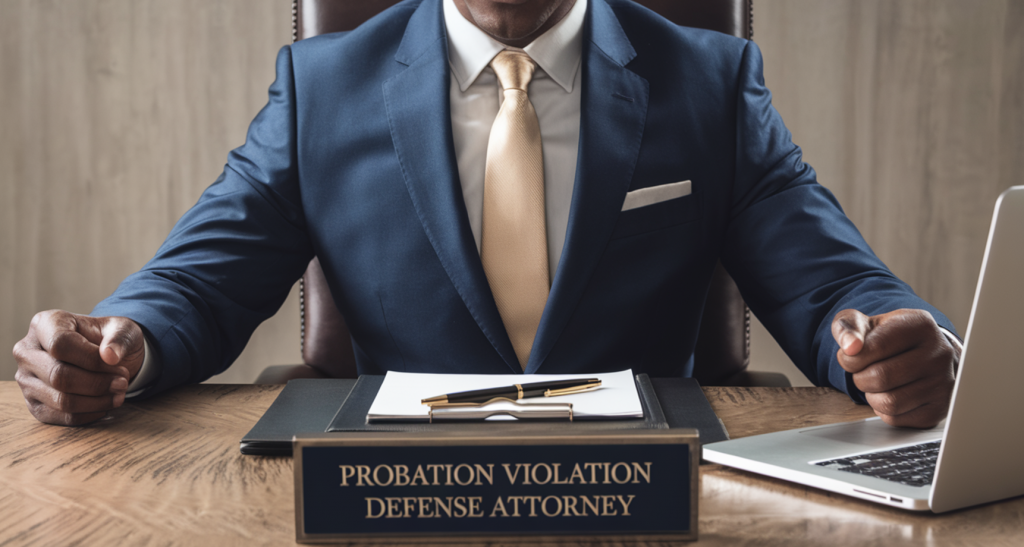A Helpful Overview of Probation Violations
Are you facing a Violation of Probation? There is hope, and you do not need to go to jail. Here is what you need to know.

Probation Violation Penalties and Defenses
In Michigan, the authority to place a person on probation comes from statutory law. MCL 771.1 authorizes probation on all felony and misdemeanor offenses, with certain exceptions. Judges consider probation “a privilege and not a right.” A Judge can place many conditions on a person’s probation. Anyone facing a probation violation will wonder how the process works and what penalty they might face. Conditions can range from any of the following:
- drug and alcohol testing,
- AA or other support group meetings,
- community service,
- educational classes,
- curfews,
- no contact orders,
- reporting requirements (in-person, email, or text)
- therapy,
- finishing school,
- keeping or finding full-time employment, and
- paying fines and costs.
Conditions can also be unusual — a local judge once ordered a man to take his supportive wife out to a nice dinner following an OWI conviction. If your probation officer accuses you of violating your probation terms or conditions, they will file a probation violation or show cause petition with the judge. If convicted of probation violation, you face the same maximum penalty for violation of probation that corresponds to the original charge. If you face a violation of probation, do not give up hope! LEWIS & DICKSTEIN, P.L.L.C. can find a way to help you.
Technical Probation Violations and Penalties
A violation of the order of probation is considered a technical probation violation, with limited exceptions, such as new criminal activity, no contact order violations, consuming alcohol while on felony OWI probation, and absconding bond.
Misdemeanor Probation
A probationer who commits a technical violation of probation on a misdemeanor case is subject to the following penalties:
- 1st violation – 5 days in jail
- 2nd violation – 10 days in jail
- 3rd violation – 15 days in jail
- 4th or subsequent violation – up to the balance of the full jail sentence available on the original charge.
Felony Probation
A probationer who commits a technical violation of probation on a felony is subject to the following penalties:
- 1st violation – 15 days in jail
- 2nd violation – 30 days in jail
- 3rd violation – 45 days in jail
- 4th or subsequent violation – up to the balance of the full prison sentence available on the original charge.

“What happens if I violate my probation?”
When a person has a probation violation, their probation violation attorney must take steps to protect them and reduce their exposure to jail or prison. First, there must be written notification of the violation and the allegations. Next, the defendant is entitled to a probation violation hearing before the judge. At the hearing, their attorney can seek dismissal of the alleged violation. If the judge finds that it is more likely than not (preponderance of the evidence) that the defendant violated probation, they will find the probationer guilty of probation violation.
If a person is found guilty of a probation violation, the judge has many sentencing options. They can reinstate probation, extend probation, change probation conditions, or order incarceration. The law does allow a judge to sentence a person for probation violation to the maximum jail/prison permitted penalty on the original charge. A zealous criminal defense lawyer will fight to achieve the least severe sentence.
“Do I have to go to jail?”
The short answer is, “No, you do not have to go to jail for a probation violation!” The longer answer is that many people go to jail when found to violate probation; however, many could have avoided a jail sentence with exemplary legal representation. Although jail is a possible probation violation penalty, it is not mandatory. With good planning and proactive mitigation, a persuasive probation violation criminal defense lawyer can prevent jail for a felony or misdemeanor VOP, even if there was a previous probation violation. The Defense Team with LEWIS & DICKSTEIN, P.L.L.C. has helped countless clients avoid jail and prison when other lawyers have said incarceration was inevitable. No matter the odds, we will do whatever is necessary to give the client the best possible chance of avoiding jail.

“What should I do if I’m facing a probation violation?”
Because there is so much at stake with a probation violation and the range of penalties so varied, it is essential that you have exceptional legal representation. The attorneys at LEWIS & DICKSTEIN, P.L.L.C. have decades of experience successfully representing people facing probation violations in Michigan. Our attorneys are experts in criminal law and well respected by other attorneys and judges alike. If you face a probation violation and possible loss of your freedom, we can help you!
Call us today at (248) 263-6800 for a free consultation or complete an online Request for Assistance Form. We will contact you promptly and find a way to help you.
We will find a way to help you.
We Are Not Afraid to Win!









